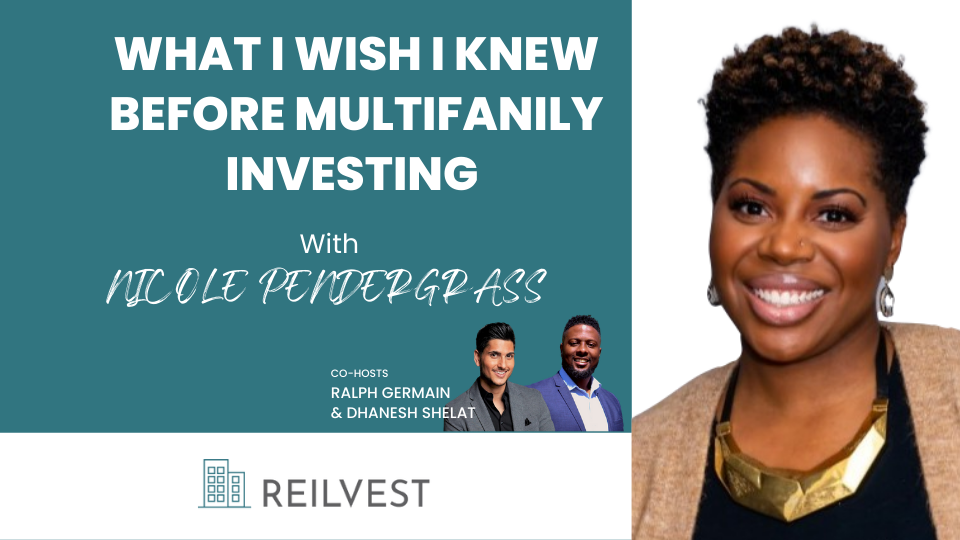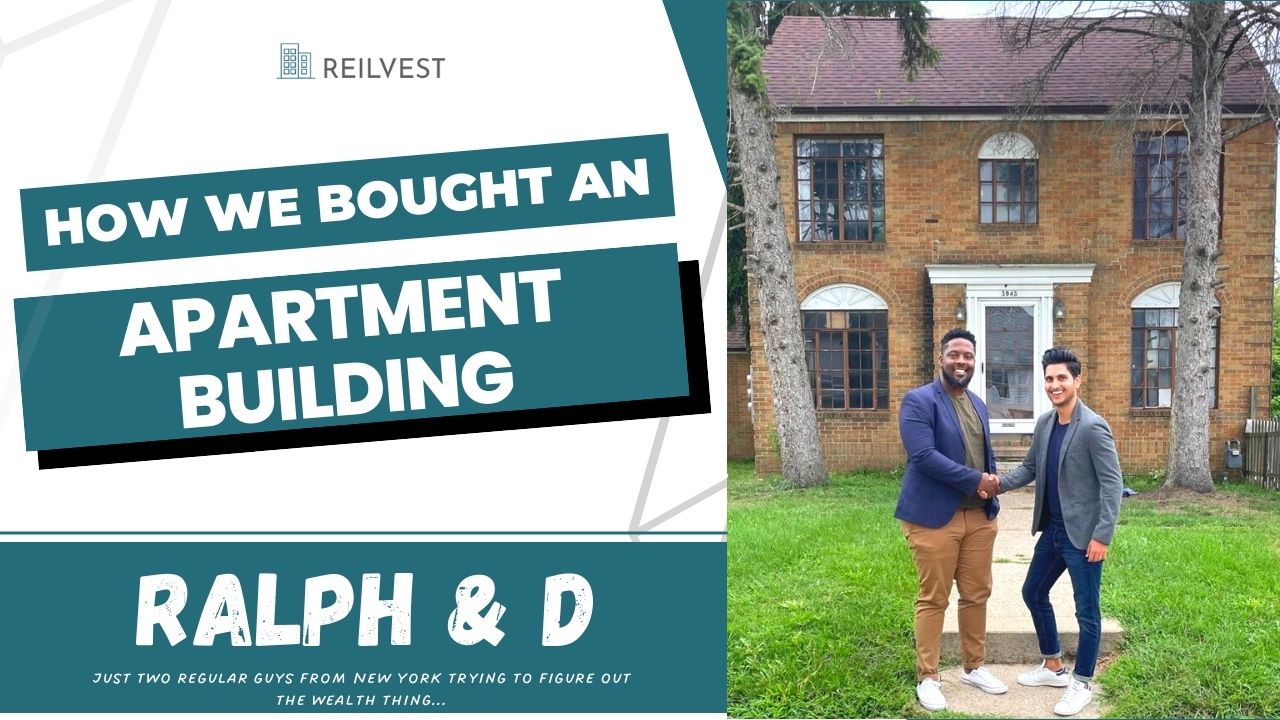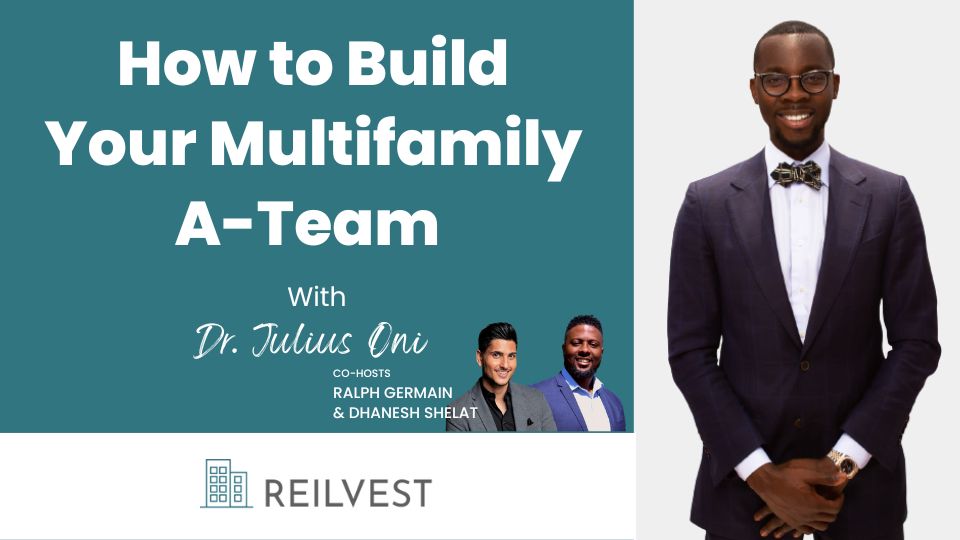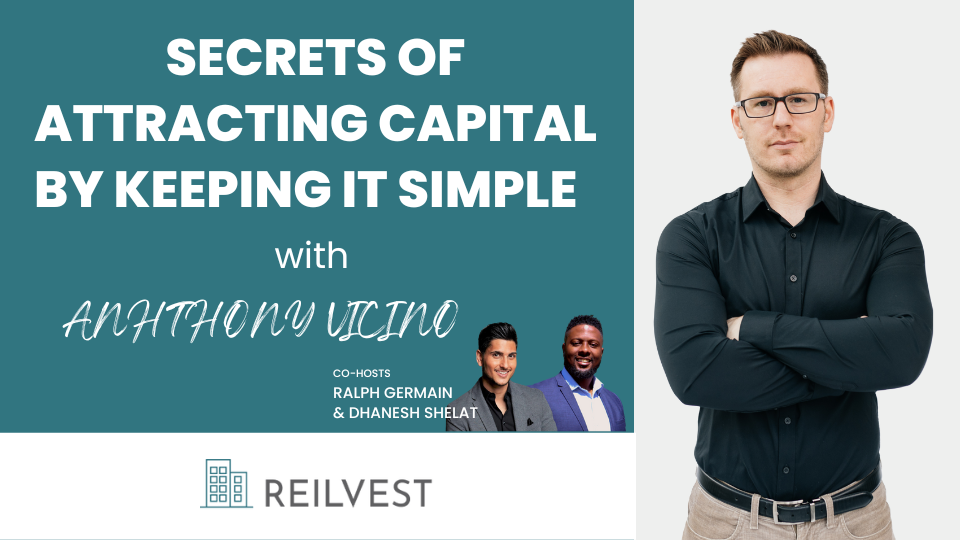Nicole Pendergrass started her real estate journey with no money, no credit and no connections. Through taking action and learning from some tough challenges, this ambitious mother of two has been able to successfully grow and diversify her capital into several wealth-building buckets. She currently is the founder and CEO of Noirvest Holdings, a real estate investment firm with the mission to ‘close the gap’ by bringing “privileged” investment opportunities to everyday, overlooked investors and helping minorities build generational wealth. She is passionate about others having equal opportunities to live financially free. Check out the interview with Nicole:
KEY TAKEAWAYS:
-
- FHAs loans with can be a great way to purchase your first home with a minimum downpayment.
- “House Hacking” is a strategy that involves renting out portions of your primary residence to generate income that is used to offset the cost of your mortgage and other expenses associated with home ownership
- Explore all your sources when considering investing in real estate, including 401Ks and Self-Directed IRAs.
- Take the time to get educated on multifamily real estate investing and build your network by joining your local Real Estate Investors Association (REIA), meetups and mentorship programs.
TRANSCRIPT
Dhanesh Shelat:
So Ralph, who do we have today?Ralph Germain:
Good morning, everybody. We have a very good, colleague and friend of Dhanesh and I, Nicole Pendergrass. Nicole, how’s it going?Nicole Pendergrass:
Good morning. Good morning. Thank you, Ralph and Dhanesh for having me here, and letting me talk to people and share my journey, and hopefully can inspire people to get started or to keep going.Ralph Germain:
For sure. It’s an honor to have you here. So I guess first start off by telling us a little bit about yourself and how you got into multifamily investing with no money, no credit, no connections.Nicole Pendergrass:
Well, I’ll tell you the long way. So I am Nicole. I actually am a full-time W2 employee. I work in healthcare. I have two toddlers, which you will hear in the background, because one is playing video games. Who is this? The Incredibles right now. And so, I’ve just been working, trying to get started, not get started, but working on this journey in real estate for a long time now. I got introduced to it through a three-day real estate conference that I went to. My husband now, then boyfriend, took me to the conference. I was blown away with the possibilities that you could create wealth and really just change the trajectory of your life through real estate, and that I didn’t know real estate investing like normal, regular people did it. And that it wasn’t just big corporations or people who had trust funds or millions of dollars. Every day, normal people could invest in real estate.Nicole Pendergrass:
And so that’s where my mindset got changed, and everything just, whoa, it blew up. And so, from then I jumped in. I joined whatever that coaching program was back then. And then I got exposed to all these different strategies. So I started with the strategy that they tell most people to start with, which is wholesaling, especially when you have no money and bad credit, because you don’t need any of that. So I started with that strategy. For two years, I actually was working on that, probably two or three. And we never did a wholesale deal in New York city. And it is just a tough market. I think there are things that they oversimplify, that process. But to be successful, there’s just a lot more involved in it than I knew or realized at the time and at that moment.Nicole Pendergrass:
And so from then, I was a member of the New York City REIA, which is something else they tell newbies to do, is join your local REIA (Real Estate Investors Association). I did that. We went on property tours and different tours in different cities there. And then a bunch of us got together, pulled our money, which was probably like of $5,000 each. We weren’t starting with a lot. And we bought a few properties in Detroit, Michigan, single families to rehab and rent out. That was a complete disaster. And from then, we basically walked away with nothing.Nicole Pendergrass:
I think because I was on the day to day management team of that with operations, we got a percentage of pay. So I think at the end of it, I walked away with maybe $800. But because I had done it through my self-directed, I transferred money from my retirement account into a self-directed IRA. And because I did that, I couldn’t take the check to myself. I had to put it back into the IRA, which at first I was like, forget this, I’m going to keep this check because now for the IRA to distribute it to me, it costs money. For me to close the account costs money. And I’m like, I only got $800. Why do I want to do that? So I was just about to say, I don’t care what the tax consequences are. I’m just going to keep this.Nicole Pendergrass:
But I went ahead and I sent it back to the IRA so that they could put in their account and they could redistribute it to me and they could think. So I don’t even know how much I netted with that, probably less than $500. So I was like, it just wasn’t worth it. And I did that because that’s just something you hear, you can invest in real estate with your self-directed IRA. But you need to know your goals and what you want to do long term. And if that even makes sense for you to do in that moment. And so it definitely didn’t make sense for me to do that. So there’s just all these strategies and things that are out there and sound great. And I’m quick to implement. Some things I like to be quick to implement. But at the same time, you got to know your goals and your trajectory and what you’re trying to accomplish, and if that even makes sense for your situation, because it may not.Nicole Pendergrass:
And then from there is when I ended up buying my three family that I house hacked in the Bronx. And that is when true momentum and the trajectory of my financial situation and my life kind of changed. I had to stumble through some hard times with that. I had non paying tenants for a year that I had to evict. I lost thousands and thousands of dollars from them not paying rent, and me having to come find money from other places so that I could pay my mortgage because I said, I refuse, I worked too hard to get this property to let you bum tenants steal it away from me because now I can’t pay my mortgage. And I say that not just because they were tenants, because there are great tenants, but these ones were not great. And so I [crosstalk 00:06:15] feel some kind of way.Ralph Germain:
I love a lot of the stuff you said here. First off, I love that you took action and then learned as you went, right? So a lot of what you said was, for sure, wholesaling and a lot of real estate investing, the concepts are really simple, but execution and everything that comes behind that is not as simple as the concepts. So for people that grasp concepts easily, you can start off. But it’s hard to execute all the way without knowing the full details. But the thing is you didn’t let that stop you. You took action. So I love that. And then you also learned as you went. So the first few investments you said you did, you didn’t really make any money or make much money. And you said a lot of it kind of went south. But I think what you learned was probably a higher ROI than what you made in terms of cash. So that’s a good thing. How did you buy this three family in the Bronx? What did you use to do that?Nicole Pendergrass:
FHA financing. So I was able to get in for three and a half percent down. A couple of months of mortgage reserves that they require. And that was it. So I probably, the purchase price was 505. So $500,000 building that I was able to control for $17,000, plus whatever closing costs. I don’t even know exactly how much they were, but I rounded up a few thousand. So I say between 20,000 and 25,000, you can control. So that’s why I love FHA. Some people will argue that it’s a more expensive loan product, which it is, but you’re being able to control the property for less money down. You know what I mean? It’s nothing like it. And I love leverage for real estate. That’s one of the main reasons real estate is such a great tool for building wealth. Because you can’t use leverage for stocks or other asset types.Ralph Germain:
Yeah. So you’re segueing to my next question. So why multifamily investing versus other types of real estate investing?Nicole Pendergrass:
Multifamily? When people talk about benefits of multifamily, a lot of people will say, oh, you get the tax benefits. You get the appreciation, blah, blah, blah. But you get that with any real estate, right? You get tax benefits, depreciation, all that kind of stuff. So why multifamily specifically? One, because it’s the economies of scale. If you have one tenant leave or move out, you have other tenants still paying. So in that situation where I had one tenant not paying for all that time, I still had another tenant. I was still living there. So I was living for free. But then I was basically having to pay what rent I would’ve had to pay if I wasn’t living in my own place. And I had another tenant who was still paying. So that helped cushion that. And it wasn’t devastating for me. Now, if that had been just a duplex, then maybe I would’ve been in a little bit more trouble. So I always advocate for more units. And I was looking for four family, and it just didn’t. The three family is what happened to come across my plate, so I went with that.Nicole Pendergrass:
The other thing for multifamily is that I think, demographic wise, we’re becoming more of a renter nation. Millennials and other younger people, they don’t like the idea of being stuck to one place for an extended period of time without the option to move around. So even now, especially with COVID and the whole work from home craze, people are able to live wherever they want and still work at their jobs. And that was a trend that was happening before COVID, but it’s now progressed and accelerated that trend.Nicole Pendergrass:
So now people, we’re much more of an entrepreneurial spirit type of society right now. And everyone’s trying to start their own thing, work for yourself. And even if you’re working for other people, they don’t want to commit. And the whole idealistic American dream of owning a house, being at the same job for 30, 40 years, retiring with your pension, all that’s kind of out the window. A lot of people aren’t subscribed to that same mindset anymore. And so, add people like baby boomers are downsizing, they’re renting apartments, they don’t have to manage and do at least the construct or the repairs and maintenance and keep up the upkeep of the property. And then millennials don’t really want to buy a property because they want to be more mobile. They don’t know where they’re going to be in five years, so why have a 30 year mortgage? So I think renting and apartment buildings is just the trend that’s happening more and more in this country, on top of the economies scales and all the other real estate benefits as far as depreciation, taxes and all that other stuff.Ralph Germain:
What would you say have been some of your biggest challenges and lessons that you’ve learned as a real estate investor so far, and then maybe some of your biggest milestones or things you’re proud of?Nicole Pendergrass:
Biggest challenges, I would say definitely sticking it out when I had those situations with rough tenants. And even now, I have better tenants. They pay on time all the time. But one of the apartments, their attitudes kind of stink. So, real estate is unpredictable, sometimes things happen. So when things happen that are inconvenient for them, I just hear it. And the hardest part for me is just staying calm and not snapping back and trying to be just, not politically correct, but just being responsible and having a calm demeanor. So managing tenants has definitely tested my resolve and my ability to respond in a calm manner to situations that are just not ideal.Nicole Pendergrass:
So even, I guess we had the Ida in the fall, and it destroyed the first floor property. The first floor unit kind of got a little flooded. I had to get the kitchen floors replaced and some other things happening in there. And they just complained the whole time I was getting things fixed. I’m getting things fixed, would you rather it stay horrible or do you want me to get things fixed? And they’re getting fixed quickly. But because you’re being inconvenienced, you’re complaining. But to me, it’s like you pick one. You want it fixed or you don’t want to fix? Which one do you want? So just dealing with tenants and learning how to deal with that situation, learning how to self-manage and deal with contractors, and just get things organized, and do all the property management work. That has been one of the biggest obstacles and biggest learning experiences that I’ve gone through, because it’s definitely not easy. And you need thick skin for real estate.Nicole Pendergrass:
But the milestones are definitely worth it because I actually am selling that property, in the process of selling that now. And the amount that I’m going to clear net is so substantial I’m able to roll that into other deals and just grow my portfolio and get rid of the property management day to day. I would rather asset manage and look over the property managers instead of being the one to receive those calls. So just being able to reposition my portfolio into bigger deals and grow. And so, it was definitely a big springboard for that. And I wouldn’t trade all of that management experience that I gained because it definitely taught me, for the long haul, what I expect from property managers and how to talk to people and deal with tenants. And everyone has a life. And these are still people who live there, whether they’re giving you a hard time or not. Sometimes it’s understandable why they might be upset. And just having that insight and looking inside myself of how I am responding to people. And it really helped me grow and gain strength as a person.Ralph Germain:
Yeah. Beautiful. I love that. And you weren’t doing property management before this, right? What were you doing before getting into real estate? What was most of your professional experience on?Nicole Pendergrass:
Healthcare. I went to school as a pre-medicine and I was planning to go to medical school. And then I started working at a hospital in between because I was going to do a post back. And I ended up deciding, as I was working at that hospital for the first couple years, that I got to make sure I really want to be a doctor before I start on this journey, because that’s a long journey. And I see these doctors now and they’re not happy, and they are just using doc because now they have so much bills and so much med school debt. And now they’ve gotten the bigger house, they got the bigger car. They have all these expenses and families that expect a certain level from them. And now they have to be a doctor because they can’t afford not to be.Nicole Pendergrass:
And so I didn’t want to be stuck there. I wanted to make sure that I knew it exactly what I wanted to do going forward. So then I started looking for what that next thing was. And that’s when I went to that three-day conference and happened to be exposed to real estate. So yes, I had no prior. I didn’t come from a real estate family. I didn’t come from a business or entrepreneurial family. I came from a regular W2, work three of four jobs at a time to support the family kind of family.Ralph Germain:
Property management is a challenge. You had to learn that. It was in the field learning, it was baptism by fire.Nicole Pendergrass:
Yes, exactly.Ralph Germain:
You earned those stripes. Congrats. What would you say are your biggest milestones, or maybe one thing you’re most proud of so far in your real estate investing career?Nicole Pendergrass:
Most proud of? Actually, my first commercial building. That actually taught me more about that next level of how I said being an asset manager and managing your property manager. And there were a lot of mistakes that I made during that time, too, just as far as communication and expectations and pushing people to do what was best for the property and best for the business plan. Because I was thinking, oh, it’s still just a small property, or it’s too small for me to be the squeaky wheel.Nicole Pendergrass:
And so that’s a limiting belief that these property managers, they know more than you because they do this on a regular basis, which may be true. They have some more insights, but at the same time, you have to keep control of your asset because this is not their money at stake. It’s yours, right? This is your family’s generational wealth and legacy that’s at stake. So I don’t care if it’s three units or six units or a hundred units, you need to make sure that they are managing it in the manner that works for you and gives you what you need and what you’re looking for from your business plan of operations for that property versus how they normally operate. And trying to find that common ground where it can work for both parties.Nicole Pendergrass:
But I think the repositioning of that six-unit and going through some struggles with that is a big milestone that I’m very proud of because that’s turning out really good. When I first was about to buy the property, one of my mentors looked at it and was like, “uh, that’s not a deal.” And so I panicked and I was like, oh my gosh, I don’t have this. I don’t have this information. I don’t have a T12, I don’t have this. I don’t know the expectations because I’m trying to get it from the property manager. And they’re giving me these roundabout numbers. Nobody wants to really sit down and say, “Okay, you can expect this much rent if you put this much money into each unit and all of that.”Nicole Pendergrass:
So I kind of went in blind. And even though I had a partner who had done it before. He’s a great person, but he’s a little more lax than I am when it comes to really wanting to crunch these numbers and stay on top of things. He’s kind of go with the flow. And I really like to pre-plan and have everything kind of set out. But I think just managing through that process and learning the ebbs and flows, and handling.Nicole Pendergrass:
Because I wanted to get the property repairs financed through the bank, and have a construction loan. And that didn’t happen. So we had to self-finance. So being able to move my money around to be able to keep up with the financing of the repairs for that property on top of everything else. And now we’re at the point where we’ve gotten the whole building basically repositioned. We have rents raised and we’ve already submitted our application for refinance. And so, we should be able to pull out almost a hundred percent of our money, purchase and rehab. So now it’ll be infinite returns after that. So I’m very proud that that proof of concept kind of got proven to me through me just going through the steps of what people have told me is possible and how it works. And now I started it and I did it on a smaller scale. And now I can take that same model and put it into bigger properties.Ralph Germain:
Yeah. Beautiful. And you’ve done so much. I just really admire your boldness and jumping into the fire. And I wish we had two more hours to talk. I’m sure we’d just learn so much more. But just a couple more questions here. So if someone was just starting out in multifamily investing, what would be the one piece of advice you would give them? If someone was brand new?Nicole Pendergrass:
Brand new. So one the first advice, and it’s kind of, I guess people think of fufu and not something that’s a hardcore do this, this, or that. But I really think knowing yourself and taking some time to really be introspective and know what your goals are, creating a vision of how you want your life to look in the future and what will get you there. And looking at the different types of strategies, real estate investment strategies and asset types, and which one fits most with the model or the vision of how you want to live your life. Because not every strategy is for every person, not every asset type is for every person. And they all come with their own caveats. So it just depends on what you are looking to do, how you want to live. Do you want to be active, even? Do you want to go through all the crap that I had to go through over these last few years? Or do you love your job, and you just want to build this on the back end as you’re going about daily life? Because then you can invest passively. So maybe that is more up your alley.Nicole Pendergrass:
So I just think people need to know that there are options to investing that don’t include you having to deal with tenants, toilets and trash. And I think a lot of people don’t realize that because they don’t understand where they really want to go. They want to decide on the next step, but they don’t know if they’re going in the right direction because they haven’t thought about their vision. And that, I think, is the most important part. And the next thing is also just getting together with a team or finding a mentor or attending meetups like this and connecting with people offline, outside of these meetups so you can talk and ask questions and get as much education.Nicole Pendergrass:
So I think creating your vision, getting educated and connecting with people, and finding a mentor, even if it’s an unofficial mentor so that you can create a plan and a roadmap to take you on the right direction. You don’t want to start climbing the ladder and you realize you’re on the wrong wall because your goal is really over there, but you didn’t plan it out first. So that’s one thing.Ralph Germain:
If you could go back in your real estate investment journey, what would you do differently, if anything? What would you do differently now knowing what you know today?Nicole Pendergrass:
Actually that. Just what I said. I didn’t sit back and know my overall values. I had an overarching goal. My goal was, I want to retire my mom early. I didn’t want her to work three jobs to support the family. I wanted her to have the lifestyle, like travel and doing whatever she wanted. So that was the overarching goal. But as far as my lifestyle, what I needed to get there, I wasn’t married, I didn’t have kids at that time. So to me, it was just like, ah, do whatever.Nicole Pendergrass:
But I didn’t also sit down. I think the most important part of things that I didn’t realize to do was sit down and think, what are my strengths and how can I add value to somebody else who’s already doing this? Like, what can I bring to the table? And that was something that I always had a limiting belief. It was like, if you are experienced, if this person is experienced, why would they want to work with me? I don’t know anything. I don’t have anything. I don’t have money. But I had time. I could run around and do things. I could travel to different cities and tour properties or meet people. I had time to implement.Nicole Pendergrass:
And a lot of times that’s what people who are busy, they don’t have the time. And so if you can take something off their plate and just knowing what you’re strong and what you’re good at, and what you can add value to somebody else. I think if I had linked up with someone and added value to them so they could unofficially mentor me. If I had been able to do that earlier in my career, I think I would’ve been further along now.Ralph Germain:
Nice. We’re going to shift to a couple of questions from the audience here. So if you folks have any questions, drop them into chat. I know I got a question sent to me here about the house hack and the FHA loan. So what was that? If you could briefly describe what was that FHA process like? How did you qualify for it? What were some of the things that you had to prepare for to get an FHA loan to house hack?Nicole Pendergrass:
Well, just knowing the requirements of the lender, which most lenders, if you’re going to do FHA, FHA is packaged. So you have to fit into certain criteria as far as debt to income, what those percentages are. So knowing what your debt to income is, which is any debt that’s actually on your credit report. So if it’s not on your credit report, the bank doesn’t see it. They don’t know what your other bills are, really. So that’s what they’re figuring that out on the debt that’s on your credit report versus the income from your taxes. You can’t just pick your income, which I was doing at first, pick your income from your W2. But if you have write offs and stuff, they’re going to look at your adjusted gross income that you filed on your taxes and then subtract your debt from your credit reports from that.Nicole Pendergrass:
And then also, I think having a mortgage broker. That was very crucial for me, because if you go specifically to one bank, you have to fit into whatever box of products they have. They have a specific product line for loans. And there are specific requirements for you to qualify for those loans. So if you don’t fit in one of those boxes, you’re going to just be denied. With a mortgage broker, they have access to a bunch of different lenders. And if they’re a good broker, then they can see your financial snapshot and pick the loan product or the lender that’s best for you.Nicole Pendergrass:
Halfway through my process, we had to switch lenders because I was about to get denied. And they don’t have a denial on your record either, because when you apply for somebody else, they will ask you, have you ever gotten denied for a mortgage before? And you don’t want to put yes, because then that’s going to make them look even more deeply into your file. And it’s going to make them be more critical. So we pulled out our application before I got the denial. The denial was not from my W2 income. It was from my taxes because I had a lot of write-offs. And so I know we always try to write off as much as possible during our taxes, but if you’re looking to purchase, maybe you hold off on those write-offs for a couple of years before you purchase something, because that will help your financial situation if you’re looking at using a lender. But he was able to switch my application over to a new lender who had a program. If you hadn’t bought anything before, they weren’t looking at your taxes. So that was my biggest problem. And then that way I was able to get approved.Nicole Pendergrass:
So I think the FHA process is just kind of, I think, finding a mortgage broker more than going to a specific bank, and knowing what your criteria is, look at what you’ve been claiming on your taxes, what your tax [inaudible 00:26:32] just income is upfront. Or have somebody help you run through that so you know what your eligibility looks like.Ralph Germain:
Yep. For sure. And house hacking is, again, one of the best ways to get started in investing because it eliminates your biggest expense, which is your living expense, if you have tenants that are paying your rent. All right. So I know we’re almost at time here. So real quickly, how do you give back? What ways do you give back? And how can people get in touch with you if they have more questions, they want to connect with you offline?Nicole Pendergrass:
Well, giving back right now is really through my social media and trying to post information and give education. I have calls with people when they do reach out to me. So my whole goal is to get people invested, especially minorities, invested into real estate, and to close that wealth gap. And I think real estate is one of the biggest ways to be able to do that because it can work for you as you’re just going about your life, as long as you go in and get educated, and you can roll with the punches kind of thing. But yes, definitely just reach out to me. I’m on LinkedIn, Instagram and Facebook, under Nicole Pendergrass. On Instagram it is nvestornikki, without the I. And my website, moirvestholdings.com, which I can put here, is also where all of my social media handles are there. You can schedule a call with me through there. You can email me through there. So I think that’s probably the best place to go right now because you can reach me from any of the other facets there.Nicole Pendergrass:
I also had another question here. Somebody asked, “How do I find the deals?” Actually for my three-family house hack, because of my experience with, okay, baby’s here. Because of my experience with wholesaling, I had learned a lot of strategies for getting direct to seller with sending yellow letters. So I knew how to pull lists from listsource.com. And I learned how the different strategies for sending direct mail so that you could get a good open rate. So what I did is I pulled a list of three and four-family properties in certain zip codes of the Bronx. And on July 4th, I sent a red envelope with a notecard in it. And I hand wrote on the note cards, and I hand wrote the envelope because I wanted them to open. So it looked an invitation or a card or something. And so the three family that I purchased actually was a response from that campaign.Ralph Germain:
Beautiful. Wholesaling is beautiful because, one, you don’t need a lot of money to get started. Make a lot of money doing it. But the biggest thing is, wholesaling teaches you how to find a good deal. And that’s a skill that you’ll need always in real estate. Nicole, thanks so much for your time. And thanks for sharing so much. I wish, again, we could have had more time to keep going, because I think this could be a full master class here today. But thanks again for sharing.Nicole Pendergrass:
No problem. Thank you for having me. And people, please reach out. I love to talk real estate. I love to help people kind of figure out their path and where they need to go, and giving whatever resources or information that I have. I am constantly sharing and sending emails. I have email drafts just saved of information that I constantly get and I just send it out when we have calls. So please reach out if you have any questions at all.Ralph Germain:
Thank you.If you’re ready to start your investing journey, we invite you to join the Reilvest Investor Club today!
Disclaimer: The views and opinions expressed in this blog post are provided for informational purposes only, and should not be construed as an offer to buy or sell any securities or to make or consider any investment or course of action.








